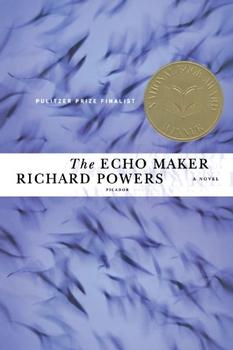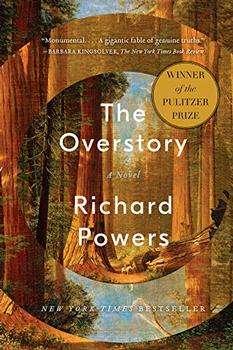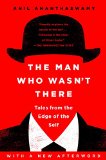Summary | Excerpt | Reading Guide | Reviews | Beyond the book | Read-Alikes | Genres & Themes | Author Bio

A Novel
by Richard PowersEvery now and then a book comes along that is so head and
shoulders above the mass of writing that it seems almost unfair to review it in
the same issue as other books. The Echo Maker is one such book.
Set against the Platte River's massive spring bird migrations, it's a gripping
story that explores one of the greatest mysteries of all, the human brain, and
how it makes us who we are, thus bearing similarities to Sebastian Faulks's recent
novel
Human Traces.
At the heart of the story is Mark, a likeable, unambitious 27-year-old, who suffers a head injury when he flips his
truck and loses his ability to recognize the things closest to him, including his sister, his dog and his house.
Capgras syndrome is normally seen as a side
effect of other issues, such as schizophrenia, so when Karin contacts the famous
bestselling neurologist Gerald Weber (modeled somewhat on
Oliver
Sacks)
about her brother, Weber is more than keen to take a closer look at the case
that might easily form the basis for his next book. While Gerald is busy
trying to solve the mysteries of Mark's brain, Mark is determined to solve the mystery of why his
real sister is being kept from him, why a fake sister has been planted on
him and who wrote the mysterious note that appeared by his bedside on his first
night in the hospital.
Meanwhile Karin is having her own identity crisis
as she finds herself inextricably drawn back into the place and people she has
tried so hard to escape, in particular her two old lovers, an eco-warrior
fighting to protect the Platte River and its bird populations, and a powerful
local property developer. Added to the mix is a mysterious nurses' aid who seems
to take an unnatural interest in Mark's treatment and Gerald's own partial
breakdown (see sidebar for more about this).
In the hands of a lesser
writer these plot elements, especially the love triangle, could so easily fall
into melodrama, but what Powers offers is far from this. Loaded with
natural symbolism and a strong environmental message The Echo Maker is
thoughtful fiction at its best and a worthy winner of the 2006 National Book Award.
As the point of view
shifts between Mark, Karin and Gerald, we also see how the shift in the dynamics
between the main characters changes - as old mysteries are solved and new ones
emerge, and the characters start to question what is real and what really
matters. No one is immune from this soul searching but, ironically, the
most impacted is Gerald Weber, the famous neurologist who merely comes
to observe an interesting case, but finds himself laid vulnerable.
Richard Powers (b. 1957) has received
numerous honors including a MacArthur Fellowship, a Lannan Literary Award, and
the James Fenimore Cooper Prize for Historical Fiction. He teaches in the
Creative Writing M.F.A. program at the University of Illinois at
Urbana-Champaign.
He grew up in the northern suburbs of Chicago, the fourth of five children.
Early in the 1960s his father, a high school principal moved the family to the
north Chicago suburb of Lincolnwood; then, when he was 11 (1968) his father
accepted a job at the International School of Bangkok, and the family spent the
next five years in Thailand, where Powers became both an accomplished music student
(cello, guitar, clarinet and saxophone) and a voracious reader - his earliest
literary passion being for nonfiction - particularly biographies and science.
He recalls feeling that he was "destined to be a scientist", thus as a teenager
he explored careers in paleontology, oceanography, archaeology and physics.
He enrolled at the University of Illinois as a physics major but was inspired to
change fields after taking an honors literature seminar (taught by Robert Schneider, a charismatic teacher and an accomplished Freudian critic who
convinced Powers that literature was the "perfect place for someone
who wanted the aerial view") - which led to him
earning an M.A. in English. After graduating, he worked in Boston as a technical writer and
computer programmer while continuing to read voraciously; he spent many weekends
at the Museum of Fine Arts where, one day, he came across a photograph titled
"Young Westerwald Farmers on Their Way to a Dance".
Within two days he had given up his job to focus on writing and three years
later, in 1985, he published Three Farmers on Their Way to a Dance. It was
praised by critics, but what most excited Powers was that at the age of 32 his
indecision was over, "It was the discovery that I didn't have to give up
anything that electrified me about writing, Here was a place where being a
dilettante was actually an asset. You could, for two years, live vicariously as
a German farmer or a molecular geneticist, that thing that you gave up at 18 and
figured you'd never visit again."
Since then he has
published a book every two to three years: Prisoner's Dilemma (1988), The Gold Bug Variations (stories, 1991), Operation
Wandering Soul (1993), Galatea 2.2 (1995), Gain (1998),
Plowing the Dark (2000), The Time of Our Singing (2003) and The
Echo Maker (2006).
![]() This review was originally published in The BookBrowse Review in November 2006, and has been updated for the
September 2007 edition.
Click here to go to this issue.
This review was originally published in The BookBrowse Review in November 2006, and has been updated for the
September 2007 edition.
Click here to go to this issue.

If you liked The Echo Maker, try these:

by Richard Powers
Published 2019
"The best novel ever written about trees, and really just one of the best novels, period."
—Ann Patchett

by Anil Ananthaswamy
Published 2016
A tour of the latest neuroscience of schizophrenia, autism, Alzheimer's disease, ecstatic epilepsy, Cotard's syndrome, out-of-body experiences, and other disorders—revealing the awesome power of the human sense of self from a master of science journalism
Your guide toexceptional books
BookBrowse seeks out and recommends the best in contemporary fiction and nonfiction—books that not only engage and entertain but also deepen our understanding of ourselves and the world around us.